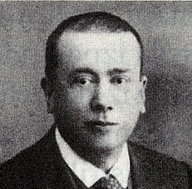Fran Milčinski
| Fran Milčinski | |
|---|---|
 |
|
| Born |
3 December 1867 Lož, Duchy of Carniola, Austria-Hungary |
| Died | 24 October 1932 (aged 64) Ljubljana, Drava Banovina, Kingdom of Yugoslavia |
| Occupation | Lawyer, writer, playwright |
Fran Milčinski (3 December 1867 – 24 October 1932), also known by the pen name Fridolin Žolna, was a Slovene lawyer, writer and playwright.
Fran Milčinski was born in Lož, a town in Inner Carniola, which was then part of Austria–Hungary. At four years of age, he and his family moved to Ljubljana, where he attended primary and secondary school. After secondary school, in 1885, he enrolled at the Faculty of Law in Vienna. In 1890 he became a judge. He worked in Ljubljana and acted as a substitute judge in Škofja Loka, Radovljica, Litija, and Brdo. In 1895 he was transferred to Idrija for two years, and returned to Ljubljana afterwards. In 1900 he became the manager of the Provincial Theatre (now the Slovenian National Opera and Ballet Theatre) in Ljubljana, and later worked as a judge and social worker in the juvenile justice system from 1902 onward. He married Marija Krejči in 1910, with whom he had four children; Breda Milčinski Slodnjak (1911–2001), Janez Milčinski (1913–1993), Frane Milčinski – Ježek (1914–1988) and Lev Milčinski (1916–2001). He assumed the position of councillor in the Provincial High Court in Ljubljana. Two years later he was nominated for councillor for the Table of the Seven in Zagreb, Croatia. He worked as a lawyer even after retiring in 1925. He made an occasional appearance on Ljubljana's radio as a story teller in 1928. He died in Ljubljana.
Milčinski was a humorist, satirist, young adult fiction writer and playwright. He started writing as a student. He was published by Rogač, Slovenski Narod, and Slovenec. His first humorous sketch stories were published in collections Igračke (1909) and Muhoborci (1912). In these works he ridicules the Slovene petty bourgeoisie and makes fun of bureaucracy, along with the political and cultural situations in which he himself grew up. His books Tolovaj Mataj and Ptički brez gnezda were published in 1917, and Gospodična Mici in 1930 in which he remarks upon the misconducts in family education, and warns about child neglect. Between wars he published humorous and satirical stories under the alias Fridolin Žolna. In these satirical sketch stories he describes actual events. His most famous collection of humorous stories is Butalci (1949); the stories were published posthumously in the monthly magazine Žika, the youth paper Naš rod and in the storybook Tolovaj Mataj. Many of his works were published posthumously (Zgodbe skavta Petra, Humoreske in groteske).
...
Wikipedia
